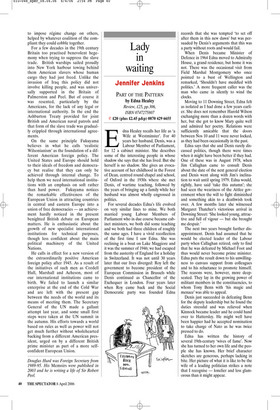Lady in waiting
Jennifer Jenkins
PART OF THE PATTERN by Edna Healey Review, £25, pp.306, ISBN 0747275807 ✆ £20 (plus £2.45 p&p) 0870 429 6655 Edna Healey recalls her life as ‘a Wife at Westminster’. For 40 years her husband, Denis, was a Labour Member of Parliament, for 12 a cabinet minister. She describes some of the interesting people in whose shadow she says that she has lived. But she herself is no shadow. She gives an evocative account of her childhood in the Forest of Dean, centred round chapel and school, of Oxford in the 1930s where she met Denis, of wartime teaching, followed by the years of bringing up a family while her husband was almost wholly engrossed in politics.
For several decades Edna’s life evolved on very similar lines to mine. We both married young Labour Members of Parliament who in due course became cabinet ministers, we both did some teaching and we both had three children of roughly the same ages. I have a vivid recollection of the first time I saw Edna. She was reclining in a boat on Lake Maggiore and it was the summer of 1946; we had escaped from the austerity of England for a holiday in Switzerland. It was not until 30 years later that our lives diverged: Roy left the government to become president of the European Commission in Brussels while Denis continued as Chancellor of the Exchequer in London. Four years later when Roy came back and the Social Democratic party was founded Edna records that she was tempted ‘to set off after them in this new dawn’ but was persuaded by Denis’s arguments that this was a party without roots and would fail.
When Denis became Minister of Defence in 1964 Edna moved to Admiralty House, a grand residence, but home it was not. There was the occasional visit from Field Marshal Montgomery who once pointed to a bust of Wellington and remarked, ‘Shouldn’t have meddled with politics.’ A more frequent caller was the man who came in silently to wind the clocks.
Moving to 11 Downing Street, Edna felt as isolated as I had done a few years earlier. She does not remember Harold Wilson exchanging more than a dozen words with her, but she got to know Mary quite well and admired her poetry. Relations were sufficiently amicable that the doors between Nos 10 and 11 were never locked, as they had been occasionally in the past.
Edna says that she and Denis rarely discussed politics, though there were times when it might have been better if they had. One of these was in August 1978, when Jim Callaghan came to consult Denis about the date of the next general election and Denis went along with Jim’s inclination to wait until spring 1979. Edna would, rightly, have said ‘take this autumn’; she had seen the weariness of the Attlee government when the will to fight diminished and something akin to a deathwish took over. A few months later she witnessed Margaret Thatcher’s victorious arrival in Downing Street: ‘She looked young, attractive and full of vigour — but she brought me despair.’ The next two years brought further disappointment. Denis had assumed that he would be elected leader of the Labour party when Callaghan retired, only to find that he was defeated by Michael Foot and thus would never become prime minister. Edna puts the result down to his unwillingness to canvass support from colleagues and to his reluctance to promote himself. The reasons were, however, more deepseated. They lay in the growing power of militant members in the constituencies, to whom Tony Benn with ‘his magic and menace’ was able to appeal.
Denis just succeeded in defeating Benn for the deputy leadership but he found the duties stressful and was relieved when Kinnock became leader and he could hand over to Hattersley. He might well have been happier had he accepted nomination to take charge of Nato as he was twice pressed to do.
Edna has written the history of several 19th-century ‘wives of fame’. Now she has turned to her own life and the people she has known. Her brief character sketches are generous, perhaps lacking in bite. Her picture of what it is like to be the wife of a leading politician strikes a note that I recognise — lonelier and less glamorous than it might appear.










































































 Previous page
Previous page